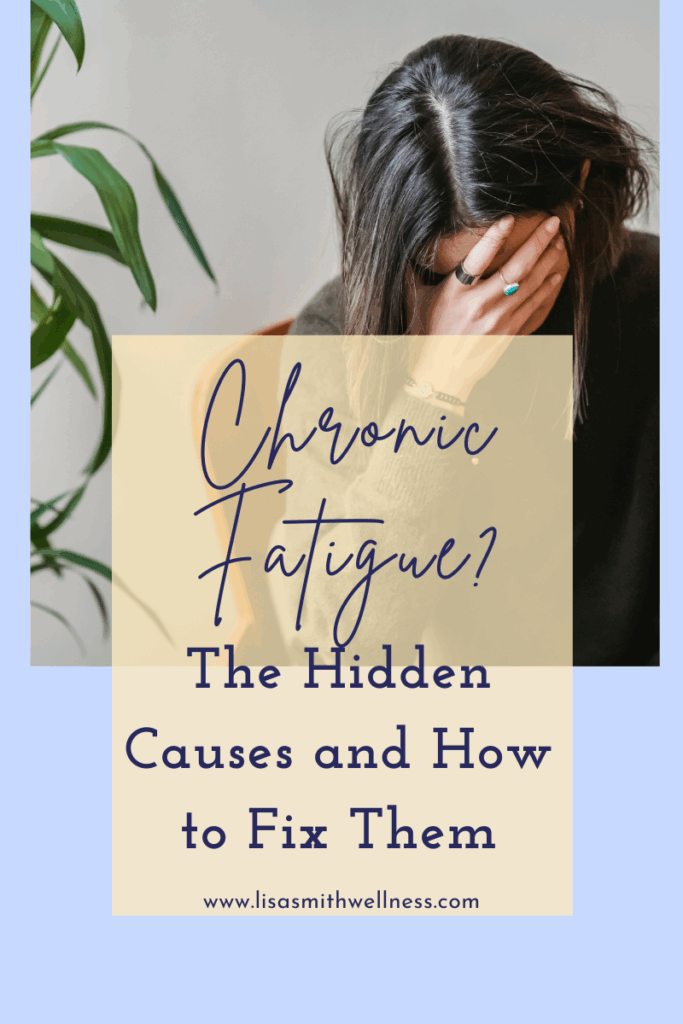We live in a culture that glorifies “busy” and runs on caffeine. But let’s be honest—if you’re dragging through the day, guzzling lattes just to feel human, that’s not normal. That’s survival mode. And if you’ve ever asked yourself, “Why am I so tired all the time?” you’re not alone. Fatigue is one of the most common complaints I hear, and while it may feel like a mystery, there are usually very real, fixable reasons behind it.
In functional medicine, we look deeper than “just stress” or “not enough sleep.” Chronic fatigue is your body waving a white flag, begging you to pay attention. And here’s the good news: once you uncover the root causes, you can reclaim your energy—and with it, clearer skin, better moods, and that glow we all want.
Let’s break down six of the most common culprits behind fatigue—and the practical steps you can take to finally feel like yourself again.
his post contains affiliate links meaning I make a small commission at no extra cost to you. Thank you for supporting the work of Lisa Smith Wellness and the Pretty Well Podcast!

1. Fuel Your Body Right: Nutrition and Diet
Food is not just calories—it’s information. Every bite you take either fuels your mitochondria (the little energy factories in your cells) or inflames them. And unfortunately, the Standard American Diet (aptly abbreviated as SAD) is an energy thief.
The Sneaky Energy Zappers
- Inflammatory oils like soybean, canola, and vegetable oil disrupt cell membranes and drive inflammation.
- Ultra Processed snacks and fast foods spike your blood sugar, then leave you crashing an hour later.
- Excess sugar isn’t just “empty calories”—it actually depletes your B vitamins and magnesium, two nutrients your body needs to make energy.
Food Sensitivities: Even “Healthy” Foods Can Cause Fatigue
Gluten, dairy, soy, and even corn are common culprits that stress the gut lining, create inflammation, and trigger an immune response that zaps your energy. If you’re dragging daily, an elimination diet can be eye-opening. (Yes, saying goodbye to bread for a few weeks may sound painful—but so is living in a constant fog.)
Nutritional Deficiencies
- Iron: Without enough iron, your cells can’t get oxygen. The result? You feel like someone unplugged your battery.
- Vitamin B12: Crucial for red blood cell production and mitochondrial energy. Low levels leave you tired, foggy, and sometimes even numb or tingly.
- Magnesium: Plays a role in over 400 enzymatic reactions—including energy production. Most people are deficient, thanks to depleted soils.
Functional Medicine Fix: Get tested before supplementing.
Then work in energy-loving foods: grass-fed beef for iron, wild-caught salmon for B12, leafy greens and pumpkin seeds for magnesium. Pair with filtered water—because dehydration alone can tank energy faster than you think.
2. Gut Health and Fatigue: The Leaky Gut Connection
If your gut is inflamed, your energy will be too.
Your small intestine lining is only one cell thick—think of it like cheesecloth. When it’s damaged (thanks to stress, antibiotics, NSAIDs, processed foods, or toxins), particles slip through into the bloodstream, triggering immune chaos. This is what’s known as leaky gut, and it’s strongly linked to fatigue, brain fog, and autoimmune flares.
Functional Medicine Fix: Heal and Seal
- Add collagen and bone broth to support gut lining repair.
- Use L-glutamine, zinc carnosine, or aloe vera supplements under the guidance of a practitioner.
- Crowd out inflammatory foods and feed your microbiome with fiber-rich veggies, chia seeds, and prebiotics like asparagus and garlic.
When your gut lining heals, your immune system calms down—and your energy rebounds.
3. Gut Infections That Zap Energy
Sometimes it’s not just what you’re eating—it’s what’s eating you. Chronic gut infections can silently drain your energy.
- Candida (yeast overgrowth): Creates fatigue, brain fog, sugar cravings, and stubborn bloating.
- H. pylori: A bacteria that damages the stomach lining and interferes with nutrient absorption when overgrown.
- SIBO (Small Intestinal Bacterial Overgrowth): When bacteria migrate where they don’t belong, they ferment food, causing gas, bloating, and nutrient theft.
Functional Medicine Fix: Test, Don’t Guess
Breath tests, stool tests, and functional lab work can pinpoint infections. Treatment may include antimicrobials (herbal or prescription), probiotics, and specific diets. When the infection clears? Energy skyrockets. Clients often say it feels like “someone turned the lights back on.”
Pin this for Later

4. Thyroid Health: The Energy Thermostat
If your thyroid isn’t happy, you won’t be either. This little butterfly-shaped gland in your neck controls metabolism, energy, and temperature regulation.
Signs Your Thyroid Needs Attention
- Fatigue that doesn’t lift—even with coffee or sleep
- Hair thinning or loss
- Dry skin, brittle nails, and slower wound healing
- Feeling cold all the time, even when others are comfortable
Hypothyroidism (underactive thyroid) or Hashimoto’s (autoimmune thyroid disease) are often behind unexplained exhaustion.
Functional Medicine Fix
Ask for a full thyroid panel (not just TSH). Look at free T3, free T4, reverse T3, and antibodies. Support thyroid health with selenium (Brazil nuts), iodine (sea vegetables), zinc (pumpkin seeds), and stress management. If your labs show dysfunction, a personalized plan—sometimes including medication—is essential.
5. Managing Stress and Supporting Adrenal Health
We live in chronic “fight-or-flight.” Emails, deadlines, traffic, doomscrolling—it’s no wonder our adrenals (tiny glands that sit on top of your kidneys) are fried. Over time, this constant cortisol release leads to adrenal dysregulation—aka “adrenal fatigue”—where you feel wired and tired, or just flat-out exhausted.
The Stress-Fatigue Cycle
Chronic stress → high cortisol → poor sleep, blood sugar swings, gut breakdown → more fatigue. And around we go.
Functional Medicine Fix: Reset Your Stress Response
- Breathwork: Slow, deep breathing stimulates the vagus nerve and shifts you into “rest and digest.”
- Yoga and walking: Gentle movement lowers cortisol and supports energy without overtaxing your system.
- Adaptogens: Herbs like ashwagandha, Rhodiola, and holy basil help regulate cortisol. Always personalize—what works for one person can overstimulate another.
- Rest rituals: Create a nighttime routine: dim lights, no screens, magnesium before bed, maybe even a warm bath. Sleep is free medicine.
6. Reducing Your Toxic Load
We’re exposed to thousands of chemicals every day—from pesticides in food to phthalates in skincare to VOCs in household cleaners. Your liver is constantly working overtime to filter these out. But when detox pathways get overloaded, fatigue is often the first red flag.
Functional Medicine Fix: Lower the Burden
- Filter your water: Invest in a high-quality filter to remove chlorine, heavy metals, and endocrine disruptors.
- Purify your air: Use HEPA filters indoors, especially in bedrooms.
- Clean up your skincare: Switch to non-toxic, beauty and body products free from parabens, phthalates, and synthetic fragrance.
- Eat for detox: Cruciferous vegetables (broccoli, kale, Brussels sprouts) support liver detox pathways. Fresh herbs like cilantro and parsley also bind and eliminate toxins.
Remember: detox isn’t a juice cleanse. It’s about supporting your body’s natural detox systems every single day.
A Note on Picky Eaters and Nutrient Gaps
If you (or your partner or child) are picky eaters, covering nutrient bases can feel like a battle. But variety is key. Try adding:
- Protein with every meal (grass-fed beef, pasture-raised poultry, wild-caught salmon, lentils, chickpeas).
- One new vegetable per week. It can take 10 tries to “like” a new food—don’t give up after the first attempt.
- High-quality supplements when needed—think methylated B vitamins, chelated magnesium, and probiotics.
And yes, treats are fine—but sugar and processed foods are anti-nutrients. They rob your body of the very minerals you need for energy. Save them for actual celebrations, not survival.
The Bottom Line: Energy Is Rebuildable
Fatigue isn’t just “getting older.” It’s a sign your body needs support. Whether it’s repairing your gut, balancing your thyroid, replenishing nutrients, or reducing toxins, there are real solutions that restore your energy at the cellular level.
When you identify (and address) the root cause, you don’t just get your energy back—you glow brighter, your skin clears, your hormones balance, and your mind sharpens. Because energy is the currency of life. And you deserve to feel vibrant, not just “getting by.”
So the next time you feel like you’re running on empty, remember: your body isn’t broken. It’s brilliant. It’s just asking for a recharge.
+ view comments . . .